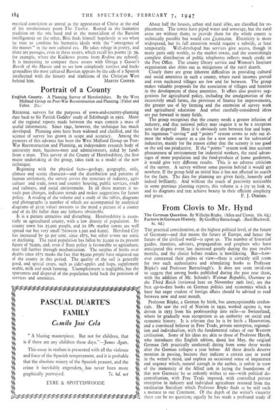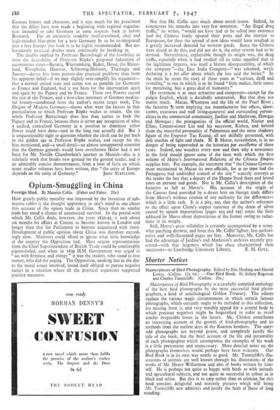From Clovis to Mr. Hynd
THE practical consideration, at the highest political level, of the future of GermanyŌĆöand that means the future of Europe, and hence the future of the civilised worldŌĆöis upon us. The number of historical guides, theorists, advisers, propagandists and prophets who have anticipated this event has increased greatly during the past twelve months, and the choice before readers is bewildering. ButŌĆöhow- ever contrasted their points of viewŌĆöthere is certainly still room for two such authoritative and stimulating books as Professor ROpke's and Professor Barraclough's. It does not seem invid_ous to suggest that among books published during the past year these, with the addition of Mr. Scheele's Weimar Republic, Overture to the Third Reich (reviewed here on November 29th last), are the best up-to-date books on German politics and economics which a busy but eager student of foreign affairs should be advised to read between now and nexr month.
Professor ROpke, a German by birth, has unexceptionable creden- tials. He saw the evil of Nazism in 1930, worked against it, was driven in 1933 from his professorship into exileŌĆöto Switzerland, where he gradually won recognition as an- authority on social and economic history. It is relevant that he is by birth a Hanoverian, and a convinced believer in Free Trade, private enterprise, regional- ism and individualism, with the fundamental values of our Western civilisation. Some of his ideas are akin to those of Professor Hayek, who introduces this English edition, dated last May, the original German (left practically unaltered) dating from some three weeks after the German collapse a year before- All these details deserve mention in passing, because they indicate a certain cast or trend in the writer's mind, and explain an occasional sense of impatience and urgency which, natural enough in the author, is unfair in view of the immensity of the Allied task in laying the foundations of that new Germany he so ardently wishes to seeŌĆöwith political de- centralisation, with Free Trade imposed, with controlled private enterprise in industry and individual agriculture restored from the totalitarian Socialism which Professor ROpke finds to be still such a menace to our Continent. Of the depth of the writer's sincerity there can be no question; equally he has made a profound study of German history and character, and it says much for his prescience that the Allies have now made a beginning with regional organisa- tion intended to take Germany in some respects back to before Bismarck. For art eminently readable (well-translated, also) and high-minded blue-print for a new Germany fit to be re-integrated into a free Europe this book is to be highly recommended. But un- fortunately practical doubts must continually be breaking in.
The doubts implied by Professor I3arraclough of the feasibility or even the desirability of Professor ROpke's proposed federation of autonomous statesŌĆöBavaria, Wurttemberg, Baden, Hesse, the Rhine- land, Westphalia, ŌĆó Hanover, Schleswig-Holstein, Thuringia and SaxonyŌĆöderive less from present-day practical problems than from his apparent beliefŌĆöif we may slightly over-simplify his argumentŌĆö that a normal united state and action was as possible for Germany as France and England, had it not been for the intervention again and again by the Papacy and by France. These twoŌĆóPowers caused the rise of the Princes, and a first-class summary of German mediae- val historyŌĆöcondensed from the author's recent larger book, The Origins of Modern GermanyŌĆöshows What were the factors in that particularism to which Professor Ropke wishes to return. . On the whole Professor Barraclough does .less than justice to both the Papacy and to France, because there-is never-any recognition of what a unified, centralised Germany in a position to dominate either Power could have doneŌĆöand in the long run- actually did. But it is unquestionably right to question.whether.the clock can be put back to the golden age as Professor ROpke wishes, and except for the bias mentioned, andŌĆöa small detailŌĆöan almost Unsupported assertion that the German generals would have overthrown Hitler had it not been for Mr. Neville Chamberlain's journey to MunichŌĆöthis is a scholarly work that breaks new ground for the general reader, and is an admirably concise demonstration, from a host of facts on which many erudite volumes have been written, that "the unity of Europe depends on the unity of Germany." jOHN STAPLETON.



































 Previous page
Previous page